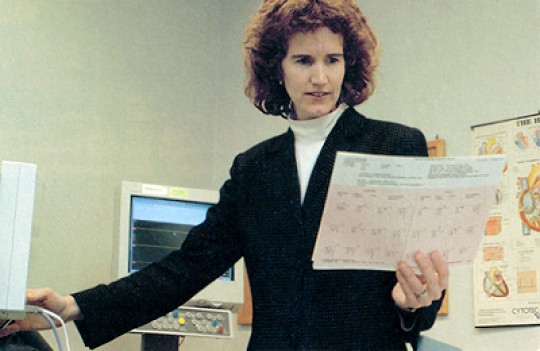Statins Linked with Lower Depression Risk in Heart Disease Patients
Statins Linked with Lower Depression Risk in Heart Disease Patients
Patients with heart disease who took cholesterol-lowering statins were significantly less likely to develop depression than those who did not, in a study by Mary Whooley, MD, a physician at the San Francisco VA Medical Center (SFVAMC) and a professor of medicine at the University of California, San Francisco (UCSF).

Mary Whooley, MD
The study was published electronically in the Journal of Clinical Psychiatry.
Whooley and her research team evaluated 965 heart disease patients for depression, and found that the patients who were on statins were significantly less likely to be clinically depressed than those who were not. They then followed the 776 patients who were not depressed – 520 who were using statins and 256 who were not – for an additional six years. Of those taking statins, 18.5 percent developed depression, compared with 28 percent of those not on the drugs. Put another way, the patients who took statins were 38 percent less likely to develop depression than patients who did not.
As the study went on, said Whooley, the difference between the two groups became more pronounced, with the patients on statins becoming less likely to develop depression and the patients not on statins becoming more likely to become depressed over time.
“This would suggest that statins may have some kind of long-term protective effect against depression, perhaps by helping to prevent atherosclerosis in the brain, which can contribute to depressive symptoms,” Whooley said.
She also noted that statins have positive effects on the endothelium – the inner lining of the blood vessels – keeping blood vessels less rigid and therefore better able to adapt to the body’s changing needs. “The exact mechanism is not known, however, and requires further study,” she said.
Whooley cautioned that it is possible that patients who take statins “are just healthier overall than those who don’t, and somehow we’re not accounting for that in our analysis, even though we adjusted for factors such as smoking, physical activity and cholesterol levels.”
If statins are definitively proven to protect against depression, said Whooley, they could be used to reduce the burden of depressive symptoms in patients with heart disease and, by extension, improve cardiovascular outcomes in depressed patients. Whooley has shown in previous studies that heart disease patients with depression are less likely to exercise and take medication, thus increasing their risk for heart attack, stroke, and other cardiovascular events.
Statins are the most commonly-prescribed medication in the world, according to the study authors. “They are relatively safe, and generally well-tolerated,” said Whooley.
Co-authors of the study are Christian Otte, MD, of Charite´ University Medical Center, Berlin, Germany, and Shoujun Zhao, PhD, of SFVAMC and UCSF.
The study was supported by funds from the Department of Veterans Affairs, the National Heart, Lung and Blood Institute, the Robert Wood Johnson Foundation, the American Federation for Aging Research, the Ischemia Research and Education Foundation and the National Alliance for Research in Schizophrenia and Depression. Some of the funds were administered by the Northern California Institute for Research and Education.
NCIRE – the Veterans Health Research Institute – is the largest research institute associated with a VA medical center. Its mission is to improve the health and well-being of veterans and the general public by supporting a world-class biomedical research program conducted by the UCSF faculty at SFVAMC.
SFVAMC has the largest medical research program in the national VA system, with more than 200 research scientists, all of whom are faculty members at UCSF.
UCSF is a leading university dedicated to promoting health worldwide through advanced biomedical research, graduate-level education in the life sciences and health professions, and excellence in patient care.
By Steve Tokar
University of California, San Francisco (UCSF)
###
> About University of California, San Francisco (UCSF).
The University of California, San Francisco (UCSF) is a leading university dedicated to promoting health worldwide through advanced biomedical research, graduate-level education in the life sciences and health professions, and excellence in patient care. It is the only UC campus in the 10-campus system dedicated exclusively to the health sciences.
More about University of California, San Francisco (UCSF).
More about University of California, San Francisco (UCSF). Information.
###
* The above story is adapted from materials provided by University of California, San Francisco (UCSF)
________________________________________________________________




















